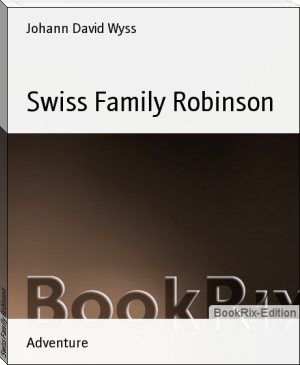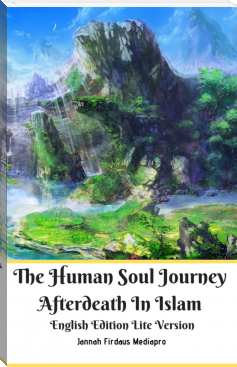Swiss Family Robinson - Johann David Wyss (poetry books to read txt) 📗

- Author: Johann David Wyss
- Performer: -
Book online «Swiss Family Robinson - Johann David Wyss (poetry books to read txt) 📗». Author Johann David Wyss
for a start.
`Stop!” I exclaimed, `we have still left something very
important undone.’
`Surely not,’ said Fritz.
`Yes,’ said I, `we have not yet joined in morning prayer. We are
only too ready, amid the cares and pleasures of this life, to
forget the God to whom we owe all things.’ Then having commended
ourselves to his protecting care, I took leave of my wife and
children, and bidding them not wander far from the boat and tent,
we parted not without some anxiety on either side, for we knew
not what might assail us in this unknown region.
We now found that the banks of the stream were on both sides so
rocky that we could get down to the water by only one narrow
passage, and there was no corresponding path on the other side.
I was glad to see this, however, for I now knew that my wife
and children were on a comparatively inaccessible spot, the other
side of the tent being protected by steep and precipitous cliffs.
Fritz and I pursued our way up the stream until we reached a point
where the waters fell from a considerable height in a cascade, and
where several large rocks lay half covered by the water; by means
of these we succeeded in crossing the stream in safety. We thus
had the sea on our left, and a long line of rocky heights, here
and there adorned with clumps of trees, stretching away inland
to the right.
We had forced our way scarcely fifty yards through the long rank
grass, which was here partly withered by the sun and much tangled,
when we were much alarmed on hearing behind us a rustling, and on
looking round, we saw the grass waving to and fro, as if some
animal were passing through it. Fritz instantly turned and brought
his gun to his shoulder, ready to fire the moment the beast
should appear.
I was much pleased with my son’s coolness and presence of mind,
for it showed me that I might thoroughly rely upon him on any
future occasion when real danger might occur. This time, however,
no savage beast rushed out, but our trusty dog Turk, whom, in
our anxiety at parting, we had forgotten, and who had been sent
after us doubtless by my thoughtful wife. I did not fail to
commend both the bravery and the discretion of my son, in not
yielding to even a rational alarm, and for waiting until he was
sure of the object before he resolved to fire.
From this little incident, however, we saw how dangerous was our
position, and how difficult escape would be should any fierce
beast steal upon us unawares: we therefore hastened to make our
way to the open seashore. Here the scene which presented itself
was indeed delightful. A background of hills, the green waving
grass, the pleasant groups of trees stretching here and there
to the very water’s edge, formed a lovely prospect.
On the smooth sand we searched carefully for any trace of our
hapless companions, but not the mark of a footstep could we find.
`Shall I fire a shot or two?’ said Fritz. `That would bring our
companions, if they are within hearing.’
`It would indeed,’ I replied, `or any savages that may be here.
No, no; let us search diligently, but as quietly as possible.’
`But why, father, should we trouble ourselves about them at all?
They left us to shift for ourselves, and I for one don’t care to
set eyes on them again.’
`You are wrong, my boy,’ said I. `In the first place, we should
not return evil for evil; then, again, they might be of great
assistance to us in building a house of some sort; and lastly,
you must remember that they took nothing with them from the
vessel, and may be perishing of hunger.’
`But father, while we are wandering here and losing our time
almost without a hope of benefit to them, why should we not
instead return to the vessel and save the animals on board?’
`When a variety of duties present themselves for our choice,
we should always give the preference to that which can confer
the most solid advantage, ” I replied. `The saving of the life
of a man is a more exalted action than contributing to the
comfort of a few quadrupeds, whom we have already supplied with
food for a few days. Also, the so is so calm at present that we
need not fear that the ship will sink or break up entirely before
we can return.”
Thus talking, we pushed on until we came to a pleasant grove
which stretched down to the water’s edge; here we halted to
rest, seating ourselves under a large tree, by a rivulet which
murmured and splashed along its pebbly bed into the great o
cean before us.
A thousand gaily plumaged birds flew twittering above us, and
Fritz and I gazed up at them. My son suddenly started up. `A
monkey,’ he exclaimed, `I am nearly sure I saw a monkey.’
As he spoke he sprang round to the other side of the tree, and
in doing so stumbled over a small round object which he handed
to me, remarking, as he did so, that it was a round bird’s nest,
of which he had often heard.
`You may have done so,’ said I, laughing, `but you need not
necessarily conclude that every round hairy thing is a bird’s
nest; this, for instance, is not one, but a cocoanut. Do you not
remember reading that a cocoanut is enclosed within a round,
fibrous covering over a hard shell, which again is surrounded
by a bulky green hull? In the one you hold in your hand, the
outer hull has been destroyed by time, which is the reason that
the twisted fibers of the inner covering are so apparent. Let
us now break the shell, and you will see the nut inside.’
Not without difficulty, we split open the nut, but, to our
disgust, found the kernel dry and uneatable.
`Hullo,’ cried Fritz, `I always thought a cocoanut was full
of delicious sweet liquid, like almond milk.’
`So it is,’ I replied, `when young and fresh, but as it ripens
the milk becomes congealed, and in course of time is solidified
into a kernel. This kernel then dries as you see here, but when
the nut falls on favourable soil, the germ within the kernel s
wells until it bursts through the shell, and, taking root, springs
up a new tree.’
`I do not understand,’ said Fritz, `how the little germ manages
to get through this great thick shell, which is not like an almond
or hazel-nut shell, that is divided down the middle already.’
`Nature provides for all things,’ I answered, taking up the
pieces. `Look here, do you see these three round holes near the
stalk; it is through them that the germ obtains egress. Now let
us find a good nut if we can.’
As cocoanuts must be over-ripe before they fall naturally from
the tree, it was not without difficulty that we obtained one in
which the kernel was not dried up. It was a little oily and
rancid, but this was not the time to be too particular. We were
so refreshed by the fruit that we could defer the repast we
called our dinner* until later in the day, and so spare our stock
of provisions.
* In this book, ‘dinner’ refers to the midday meal.
Continuing our way through a thicket, which was so densely
overgrown with lianas that we had to clear a passage with our
hatchets, we again emerged on the seashore beyond, and found an
open view, the forest sweeping inland, while on the space before
us stood at intervals single trees of remarkable appearance.
These at once attracted Fritz’s observant eye, and he pointed
to them, exclaiming: `Oh, what absurd-looking trees, father!
See what strange bumps there are on the trunks.’
We approached to examine them, and I recognized them as calabash
trees, the fruit of which grows in this curious way on the stems,
and is a species of gourd, from the hard rind of which bowls,
spoons, and bottles can be made. `The savages,’ I remarked, `are
said to form these things most ingeniously, using them to contain
liquids: indeed, they actually cook food in them.’
`Oh, but that is impossible,’ returned Fritz. `I am quite sure
this rind would be burnt through directly it was set on the fire.’
`I did not say it was set on the fire at all. When the gourd has
been divided in two, and the shell or rind emptied of its contents,
it is filled with water, into which the fish, or whatever is to
be cooked, is put; red-hot stones are added until the water boils;
the food becomes fit to eat, and the gourd-rind remains uninjured.’
`That is a very clever plan: very simple too. I daresay I should
have hit on it, if I had tried,’ said Fritz.
`The friends of Columbus thought it very easy to make an egg
stand upon its end when he had shown them how to do it. But now
suppose we prepare some of these calabashes, that they may be
ready for use when we take them home.’
Fritz instantly took up one of the gourds, and tried to split it
equally with his knife, but in vain: the blade slipped, and the
calabash was cut jaggedly. `What a nuisance!’ said Fritz, flinging
it down, `The thing is spoiled; and yet it seemed so simple to
divide it properly.’
`Stay,’ said I, `you are too impatient, those pieces are not
useless. Do you try to fashion from them a spoon or two while
I provide a dish.’ I then took from my pocket a piece of string,
which I tied tightly round a gourd, as near one end of it as I
could; then tapping the string with the back of my knife, it
penetrated the outer shell. When this was accomplished, I tied
the string yet tighter; and drawing the ends with all my might,
the gourd fell, divided exactly as I wished.
`That is clever!’ cried Fritz. `What in the world put that plan
into your head?’
`It is a plan,’ I replied, `which savages adopt, as I have learned
from reading books of travel.’
`Well, it certainly makes a capital soup-tureen, and a soup-plate
too,’ said Fritz, examining the gourd. `But supposing you had
wanted to make a bottle, how would you have set to work?’
`It would be an easier operation than this, if possible. All that
is necessary, is to cut a round hole at one end, then to scoop
out the interior, and to drop in several shot or stones; when
these are shaken, any remaining portions of the fruit are detached,
and the gourd is thoroughly cleaned, and the bottle completed.’
`That would not make a very convenient bottle though, father; it
would be more like a barrel.’
`True, my boy; if you want a more shapely vessel, you must take
it in hand when it is younger. To give it a neck, for instance,
you must tie a bandage round the young gourd while it is still
on the tree, and then all will swell but that part which you have
checked.’ As I spoke, I filled the gourds with sand, and left
them to dry; marking the spot that we might return for them on
our way back.
`Are the bottle-shaped gourds I have seen in Europe trained
similarly?’
`No, they are of another species, and what you





Comments (0)